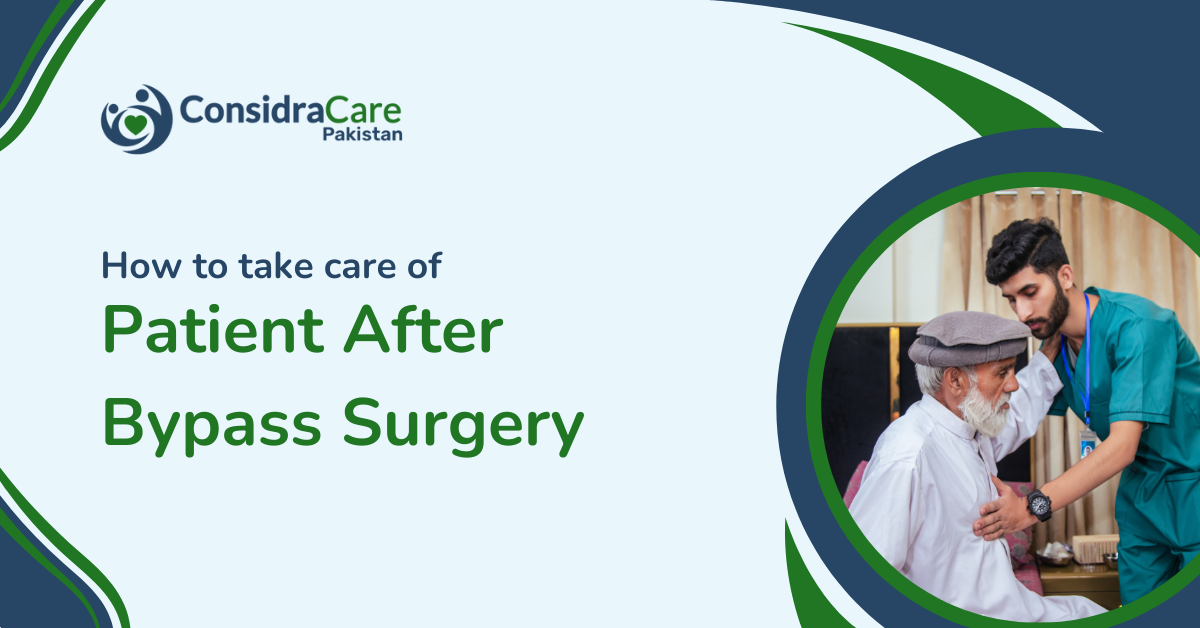Bypass surgery is a commonly used procedure to treat coronary artery disease. Patients who undergo this surgery need proper and effective post-operative care to recover fully. According to the World Health Organization, 240,720 people died from coronary heart disease in Pakistan in just one year, accounting for 16.49% of all deaths. Pakistan ranks 30th in the world with a death rate of 193.56 per 100,000. In this blog, we will provide useful guidelines on how you can take care of a patient after bypass surgery.
Table of Contents
ToggleRisks Related to Bypass Surgery:
Before discussing the details of how to take care of a patient after bypass surgery, it is important to understand the risks of bypass surgery. Like any surgical procedure, it carries certain risks include:
- Bleeding
- Heart attack due to blood clotting
- Infection at the chest wound site
- Kidney problems
- Memory loss
- Stroke
The risk of complications may be higher if the surgery is done as an emergency procedure. The patient’s overall health before surgery also plays a vital role in determining the risk of complications, especially if they have diabetes or kidney-related issues.
Care After Surgery:
After the surgery, both in the hospital and at home, it is essential to closely monitor the patient’s condition for any signs of complications. Some symptoms to watch out for include:
- Fever
- Rapid heart rate
- Changes in skin color around the chest wound
- Bleeding or discharge from the chest wound
The patient’s condition and needs may vary depending on the type and extent of the surgery. However, there are some general guidelines that can help caregivers provide the best possible care for the patient after the surgery. These guidelines can be divided into 2 sections: hospital care and home care.
Hospital Care:
During the hospital stay, specialized care is required for patients who have undergone bypass surgery. The medical team will closely monitor vital signs, provide appropriate pain medication, and ensure proper wound care. Nurses can contribute by visiting the patient regularly, maintaining effective communication, and offering words of encouragement. It is important to be familiar with the tests the patient will undergo before discharge, follow instructions diligently, and schedule necessary follow-up appointments.
For exceptional care after bypass surgery, trust ConsidraCare Pakistan. Our experienced team provides compassionate post-operative care and home nursing services, ensuring a smooth recovery journey. Call Now!
Home Care:
After returning home, attentive care and assistance are crucial for the patient’s recovery. This includes managing medications, following dietary guidelines, and gradually incorporating physical activity. Research has shown that participating in cardiac rehabilitation programs after bypass surgery reduces mortality rates by 25%. Attendants should actively assist the patient in taking prescribed medication, observe any changes in their condition, and promptly report concerns to healthcare providers. Emotional support during recovery, establishing positive routines, and addressing emotional challenges are essential.
It is important to note that taking care of a patient at home can be a challenging task, especially if you do not have the right skills and expertise. In such cases, it is advisable to hire a professional and skilled home care nurse who can provide the necessary care and support to the patient. By hiring a home care nurse, you can ensure that your loved one receives the best possible care in the comfort of their own home.
Lifestyle Changes for Heart Health:
Lifestyle changes are important for managing and improving heart health after bypass surgery. Here are some recommended steps:
- Quit smoking: Consult with a healthcare provider for assistance in quitting.
- Follow a healthy diet: Choose a diet rich in fruits, vegetables, and whole grains. Limit sugar, salt, and saturated fats.
- Maintain a healthy weight: Seek guidance from a healthcare provider to determine a healthy weight.
- Engage in regular exercise: Aim for 30 to 60 minutes of exercise most days of the week with approval from the healthcare provider.
- Manage stress: Find ways to reduce emotional stress and consult with a healthcare provider for appropriate strategies.
- Ensure adequate sleep: Recommended for adults to get 7 to 9 hours of sleep daily.
Conclusion:
Post-operative care is vital for patients undergoing bypass surgery to ensure successful recovery. Close monitoring of symptoms, adherence to medical instructions, and active participation in cardiac rehabilitation programs can greatly improve outcomes. Caregivers play a critical role by providing emotional support, assisting with medication management, and helping patients adopt healthy lifestyle changes. Collaborating with healthcare providers and following the above-mentioned guidelines will maximize the chances of a full and successful recovery.
Maryam is a leading writer at ConsidraCare, specializing in senior care. Her well-researched articles are widely recognized for guiding families through the complexities of caring for loved ones, establishing her as a trusted and authoritative voice in the field.



